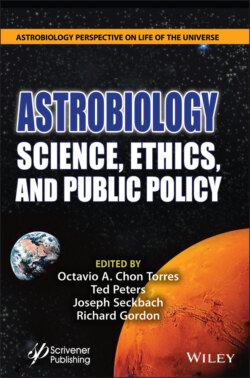Читать книгу Astrobiology - Группа авторов - Страница 28
2.2.2.3 A Secular Grounding for Astroethics?
ОглавлениеWe have just reviewed a distinctively Christian approach to ethics based upon a vision of the common good; and we have reviewed some religious alternatives. What about an avowedly non-religious or secular public agenda for astroethics? One admirable attempt is offered by Kelly C. Smith of Clemson University.
How does Smith answer our grounding questions? Who are we? According to Smith, we are human beings who have evolved into social creatures and have constructed culture. What do we value? We value reason. Smith describes the human race as “ratiocentric.” This leads to a “package deal” in which the “sociality-reason-culture triad (SRCT) is the proper basis for intrinsic moral value” [2.78]. What should we do? We should search for the extraterrestrial equivalent of ourselves—for SRCT aliens—and then expect that both the aliens and ourselves would share the same basic ethical structure. “The SRCT linkage may be so strong that it constitutes a universal property of other intelligent species in the universe” [2.78] [2.68].
Rather than ol’ fashioned manifest destiny, Smith advocates “manifest complexity,” a doctrine according to which rational intelligence should come to rule in the universe. Our purpose as rational beings is to “maximize universal complexity” [2.78], something SRCT aliens would understand and share with us.
This is a secular ethic grounded in a selected human trait, rational capacity or intelligence. Reason is lifted up as morally foundational, not an uncommon move in our post-Enlightenment era. In principle, any ethicist could lift up any trait to serve as the ground for intrinsic value. Christian ethicists are not likely to embrace Smith’s ratiocentrism. Much higher on the Christian value scale than reason are affections such as compassion, love, service, and justice. For the Christian, mentally disabled or socially inept or culturally marginalized persons each have dignity; each has intrinsic value and should be treated as a moral end and not merely a means. Smart humans are not more valuable than dumb ones on the Christian scale of values. This commitment to universal human dignity is grounded in God’s conferral of dignity on us in the incarnation. In sum, Smith’s astroethic may seem persuasive only to that segment of society which is already ratiocentric.
Despite this demur, Smith has provided a laudably coherent argument, in my judgment. The fact that Smith’s program seems arbitrary is by no means his fault. It is due to the fact that we live in a pluralistic world with moral relativity. It is difficult to ground any ethic that could be universal in our situation. Therefore, what a theological ethicist should do is promulgate a religiously grounded point of departure and then look for overlap with others representing differing perspectives toward the end of seeking sufficient common grounds to launch a single global community of moral deliberation. Smith’s naturalistic justification for valuing life provides an enticing overlap if not partnership.
As just suggested, a secular astroethics of responsibility is likely to seek some level of grounding in one or another form of naturalism. The ethicist will ask nature to provide foundational insights for human valuing. This method risks committing the naturalistic fallacy—that is, drawing a moral “ought” out of an already existing “is.” Yet, without a transcendent grounding in the divine, nature is about all that is left to undergird an ethical vision.
Kelly Smith and Steven Dick, along with Hans Jonas, bring to the astroethical construction site a welcome supply of nature’s building materials. When we pour an aggregate of naturalistic gravel and theological stones into the concrete, the resulting foundation will be firm. “While theology can provide potentially universal principles such as compassion and dignity that will be useful in the context of astroethics, the problematic naturalistic fallacy should not stand in the way of secular ethics playing an important and perhaps predominant role” [2.26]. In short, theological and secular ethicists should link arms in constructing a superstructure of quandaries that lead to fitting moral responses.
